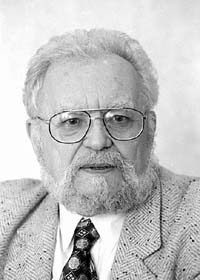According to what possible scenarios will the future parliamentary majority be formed?

Prof. Myroslav POPOVYCH, Ph.D., Director of the Institute of Philosophy, Ukrainian National Academy of Sciences:
The situation is easy to characterize: an equilibrium of forces — three basic forces, as expected. The first one is the Presidential Administration. It’s a political party, a political force which has its motto: “implementation of the results of the [April 2001] national referendum, or, in other words, a so-called manageable democracy. This motto wasn’t supported by voters. Some 12% of votes collected by the For a United Ukraine bloc is quite eloquent.
The second force is indefinite, an opposition that might be characterized as national-democratic. But that’s not quite so — it doesn’t have a clear national democratic program (the Our Ukraine bloc). Actually, it has a totally non-democratic element, a Right wing which managed to make it to the parliament only because Yushchenko entered the bloc alone, bare-handed. He built it of whatever was close at hand. The bloc’s leader can hardly be criticized for what he did, except, maybe, for one thing — he should have constantly dissociated himself from extremism within his camp. Later we’ll see what will come out of this bloc. And so far it’s only a semi-opposition, because Yushchenko himself didn’t want to be in the opposition, but he was forced, I’d say forced very clumsily into it by the Presidential Administration.
And the third force is the Red opposition, the Communists. I don’t count two big opposition groups, Oleksandr Moroz’s Socialist Party and the Yuliya Tymoshenko bloc; it’s a rather specific opposition. Moroz evidently enjoys support in rural areas and in the intermediate zone which stretches from the pro-Yushchenko northwest to the Red south and southeast (Central Ukraine from Khmelnytsky to Poltava). He needs to gain his own position, but he’s still a long way from it. Yet, the Socialist Party is a real force with an expressive political face.
I can say that the Tymoshenko bloc’s political face is quite expressive also. It united mostly representatives of the radical Right. But I don’t think the bloc’s leader is its real face. We’ll wait and see what position she’ll take, what she will choose. The bloc just collected radical opponents of the regime from every corner.
The general picture looks somewhat different after the ballots are counted in one-mandate constituencies: both in villages and cities, voters were well-informed about the parties. They chose those they liked best and winnowed out all intermediate, pro-authority structures, as if they had never existed. But in one-mandate constituencies it’s not a favored party, but a person, a benefactor who wins. Most votes in those constituencies were collected either by very high-placed officials or very rich people. Now it’s the turn of one-mandate constituencies to make the general picture complete.
Serhiy MAKEYEV, Ph.D. in Sociology, Director of the Center of Political Analysis and Consulting
I think the voters’ choices have made life very difficult for our political players. They’ll have great difficulty agreeing among themselves, to say nothing of forming a stable majority. The controversies and disputes, already pronounced by the leaders of our parties, leave little hope for such a stable majority. For the most part, the majority in the new parliament will be a floating one when particular issues are debated. And that will be the main feature of the new parliament’s work. Many factors will influence the majority’s political composition, and every time it will puzzle observers and journalists. But there won’t be anything bad about such a situational composition, because politics is an art of compromise and coexistence, and the representatives of the political elite will have to coexist for the next four years, living on compromises. Otherwise, the parliament ought to adopt a decision on self-dissolution. But I’m convinced the parliament won’t do that.
The Communists and For a United Ukraine have announced that they might vote together when national interests are involved. And there’s nothing to worry about, because today’s KPU is a party that supports Ukraine’s sovereign statehood. The initiation of [Kuchma’s] impeachment won’t be in the way for them to adopt the national budget together with the FUU. I could expect an alliance of Our Ukraine and FUU when, say, the speakership is voted on. But as a lasting majority, such a combination is impossible. Nor will there be a so- called opposition majority, composed of Yushchenko’s bloc, Tymoshenko’s bloc, and Moroz’s SPU. Tymoshenko and Moroz might support the Communists on the impeachment issue, but a majority is out of question. And Our Ukraine will never support them on that.
Prof. Volodymyr VOITENKO:
One of the most likely scenarios is an alliance of For a United Ukraine and the KPU. If we look at the KPU’s program and consider what FUU leader Lytvyn said about civil society in Ukraine, we won’t see any difference. If we look how Ukrainians voted for these two political forces, we can also see complete identity. So they have a practical reason to make an alliance. Of course, it will be not open but an under the carpet alliance. That’s why we need to see how they will vote on the crucial issues of the domestic and foreign policies. I don’t have the slightest doubt that these two nomenklatura bureaucratic forces are simply bound to come together. The other political parties that were or were thought to be pro-presidential should consider this scenario. What’s gone is gone. With the next presidential elections already in sight, the president and his team have launched an offensive. There are two options for the majority’s composition: the Communists, For a United Ukraine, Yushchenko, Tymoshenko, and Moroz, with all the rest looking for their place in either. As for the strategy, Ukraine’s interests, we should be aware who stands behind the Communist Party and For a United Ukraine. No matter what they say about it, they are against Ukraine.






